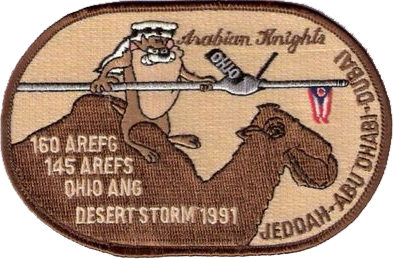Retailers of “morale patches” have come under fire from a recent lawsuit alleging that use of the term is a trademark infringement.
You’ve probably seen them around: creatively designed patches with slogans and images ranging from funny to downright offensive. Available for purchase on dozens of different websites, customers can find everything from Tiger King’s Joe Exotic to tactical White Claws displayed on small, Velcro-backed cutouts of rubber and cloth.
These humorous, tactical decorations are believed to have originated before World War I in the British Army, according to the San Francisco Chronicle. And for many units from Vietnam to Iraq, the patches were adequately named.
Much akin to airplane nose art in the distinction and prestige they provided service members, many morale patches were the forerunners of unit patches approved for wear today. The 1st Infantry Division’s “Big Red 1” and 101st Airborne’s “Screaming Eagle” both originated as informal morale patches.

Velcro enabled designs to become increasingly humorous and offensive in recent history, with soldiers, sailors, airmen, and Marines simply able to remove the patches from their uniforms when necessary. Numerous websites caught on to the trend and continue to offer custom-designed morale patches to troops.
Patch retailer Morale Patch Armory trademarked the widely used “morale patch” term in 2017 in a move that garnered backlash from consumers and retailers alike. The Iowa-based company even reported receiving death threats when Facebook removed a group with “morale patch” in its name for trademark infringement.
“We have not and as of right now have no intention of using litigation against anyone or any entity who sells or designs morale patches,” the company said in a 2017 Facebook article responding to the backlash.
Somewhere along the way, their intentions changed. Morale Patch Armory filed a lawsuit on Aug. 14 alleging that 281 unnamed companies were conducting “illegal operations” by using the trademarked term to sell similar goods.
“Defendants are directly and personally contributing to, inducing and engaging in the sale of Infringing Products,” the complaint filed in the Northern District of Illinois stated.
Those targeted by the lawsuit disagree.
“Morale Patch Armory has no trademark rights to assert. Its claimed trademark is generic — it stands for the thing being sold, rather than a particular seller, which is what a trademark does,” defense attorney Mike Atkins, who represents retailer Empire Tactical in the suit, told Military Times.
The complaint filed by Morale Patch Armory asks that all defendants be restrained from future use of the term “morale patch” and pay $100,000 in damages for each and every use of the term.
“Morale Patch Armory doesn’t own the words ‘morale patch.’ Those words have been used for more than 50 years before Morale Patch Armory came onto the scene,” said Atkins. “It’s offensive for them to claim those words as their own.”
Morale Patch Armory was not immediately available to comment on why they chose to pursue a lawsuit at this time or why they believe the term to be exclusively their own.

Prometheus Design Werx, another retailer listed in the suit, filed with the U.S. Patent and Trademark Office for the cancellation of Morale Patch Armory’s trademark on Sept. 10.
“The internet is replete with sources, including eBay and Amazon, selling patches and calling these patches ‘morale patches,’” the request for cancellation, which also believes the term to be generic, stated. “Many of these sources have been selling such patches for decades and consumers are collectors of these items.”
Adam Pfeifle, owner of Empire Tactical and an Iraq veteran, has been using the term “morale patch” since 2013 — three years before Morale Patch Armory claimed first use of their trademark.
Pfeifle told Military Times that he hopes service members will rally behind the defendants' cause. Those who wish to assist, he said, can donate to his company’s GoFundMe, where proceeds left over after paying for legal funds will be donated to the VFW.
Harm Venhuizen is an editorial intern at Military Times. He is studying political science and philosophy at Calvin University, where he's also in the Army ROTC program.
Tags:
MPAlawsuit morale patchmilitary morale patchmorale patchesbest morale patchesfunniest morale patchesmorale patch copyrightmorale patch lawsuitIn Other News















